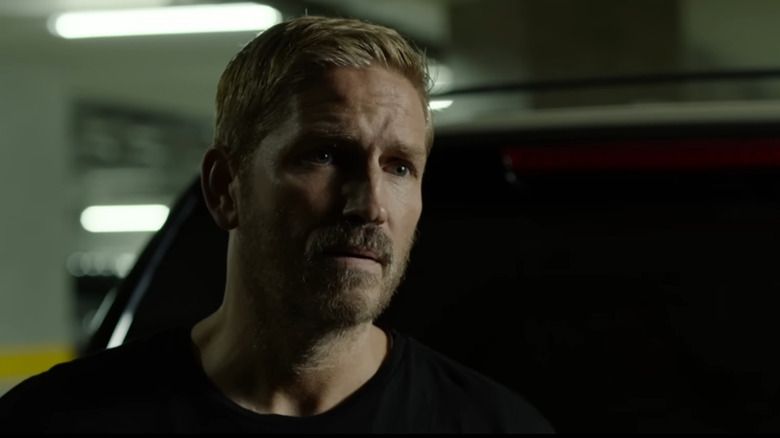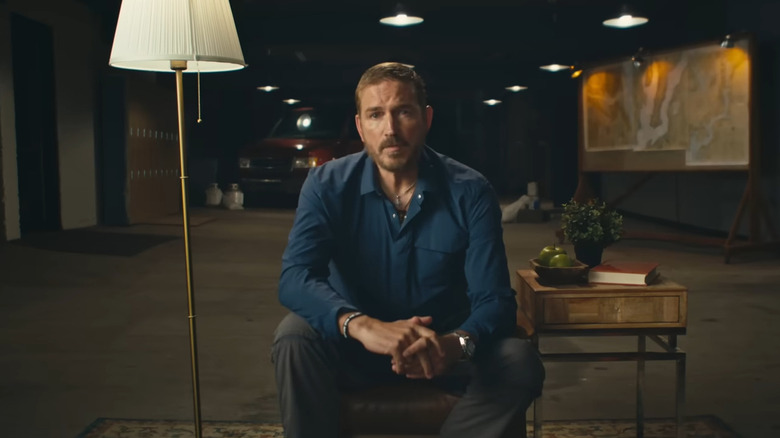Astroturfing: Sound Of Freedom's Newest Conspiracy Explained
The question on everyone's mind seems to be: "Who exactly is watching 'Sound of Freedom'?" The surprise hit from Angel Studios (led by "The Passion of the Christ" star Jim Caviezel) has had an impressive box office run since its July 4th release, thanks in part to its peculiar Pay It Forward campaign that essentially allows fans to make a non-charitable contribution to the studio so that a future audience member can claim a free ticket. The gimmick appears to have paid off, though some suspiciously empty screenings have social media users calling "astroturf."
Generally used in a political context, the phrase astroturfing refers to the deceptive practice of presenting an organization, political movement, or candidate as being supported by an organic collective of ordinary people (grassroots campaigns) when it is in actuality being supported by powerful groups (such as corporations, political think tanks, or, in certain cases, wealthy individuals). One non-political example of astroturfing targeted at consumers rather than constituents is a 2013 instance involving the phone company Samsung, which was fined $340,000 by the Taiwanese FTC after they allegedly paid for negative reviews of a competitor phone, the HTC One. In the entertainment industry, there were allegations that the #ReleaseTheSnyderCut and the "Justice League" and "Army of the Dead" Oscar voting campaigns were astroturfed in part by paid bots.
The allegations made against "Sound of Freedom" stem from claims that moviegoers have attended apparently sold-out showings of the film only to find them empty. The theory goes that Angel Studios — or some entity seeking to support them — is buying up large swaths of tickets through the film's Pay It Forward marketing campaign in order to bolster ticket sales.
Is Sound of Freedom actually being astroturfed? Not exactly
For us to claim that "Sound of Freedom's" box office success was entirely based on direct astroturfing, there would need to be evidence of a person or organization either directly involved with the production or with a vested interest in its success buying these tickets. Because Angel Studios has kept its Pay It Forward stats mostly confidential (save for a self-reported claim that 20% of opening-day sales were from PIF), there is no way to confirm or deny this with certainty. Based on the more than 10,000 verified audience reviews on Rotten Tomatoes, there certainly seems to be a sizeable and vocal audience for "Sound of Freedom" — whether or not they bought their own tickets.
Some (including screenwriter C. Robert Cargill) have theorized that "Sound of Freedom's" ticket sales may be due in large part to religious groups making donations or buying ticket blocks for their congregation or as charitable donations. While there's no solid evidence to indicate whether or not these groups played a major role in the film's box office success, the distributor's website does specifically lay out various ways large groups — such as a church or business — can purchase blocks of tickets. There's even an email template in their FAQ section for viewers to request a private screening at their local theater.
Though the film may not be running a traditional astroturfing scheme, some may feel a certain degree of deceptiveness in the film's marketing. The ads, usually ending with Jim Caviezel speaking directly to the audience, push a narrative of strong consumer-based activism that doesn't seem to hold up when considering the perspective of those trying to stop human trafficking in the real world.
Sound of Freedom paints a vivid - and questionable - picture
"'Sound of Freedom' is one of those films that can legitimately change the world," urges Jim Caviezel in one ad for the film. "So we want to ignite a fire in audiences and open their eyes to the dark reality of millions of children that need our help. Let's make this film a historic event and the start of the end of child trafficking."
As far as sales pitches go, it's hard to imagine one more visceral than claiming your movie could save "millions of children." Unfortunately, numerous real-life organizations actually trying to end child trafficking — including representatives from the National Children's Alliance and Freedom Network USA — described the film's depiction of this crime as inaccurate, sensationalized, and materially unhelpful.
Caviezel's own bona fides with regard to child trafficking are troubling at best, considering he ascribes to the QAnon conspiracy that so-called "elites" are harvesting adrenochrome from the blood of stolen children to preserve their youth; the real-life figure he plays, Tim Ballard, also subscribes to QAnon beliefs. There are also disturbing allegations that producer Leo Severino groomed his wife while she was a young teen and he was a 30-plus-year-old youth pastor. Most recently, one of the film's major financiers, Fabian Marta, was arrested for felony child kidnapping. While "Sound of Freedom's" success may not be astroturfed, it isn't hard to see why many feel it relies on a shaky and potentially dishonest moral framework.


